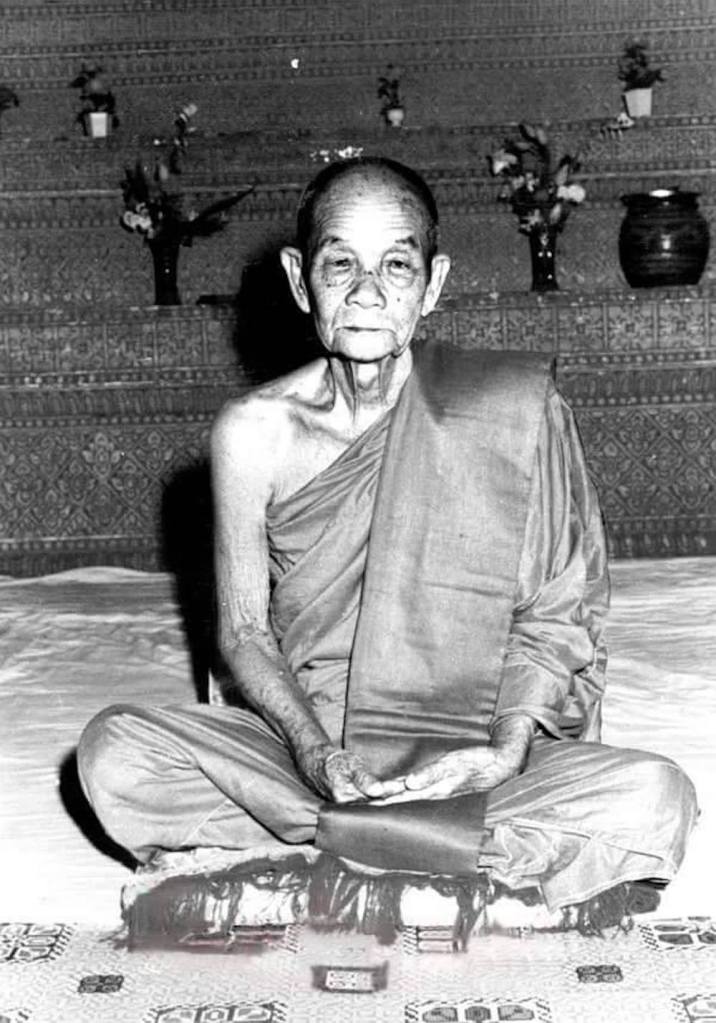
[Editor’s Note: I’ve had to discontinue last week’s Phra Payutto text due to vision strain after treatment at the eye hospital on 31 July. I expect things to get back to normal in a few days. However, it’s also an opportunity to consider a completely different way of Teaching; from the flowing almost poetic language of Phra Payutto, to the minimalist expression of Luang Pu Dune. The following is taken from the introduction and text of the book: “The Gifts He Left Behind” compiled by Phra Bodhinandamuni. (Note: The term “Luang Pu” in Thai, means “Venerable Grandfather,” a title for respected senior Buddhist monastics.)
Luang Pu Dune (Ajahn Dune Atulo) 1888-1983, ordained at the age of 22 and after six years, disillusioned with his life as an uneducated town monk, he left to study in a temple in Ubon Ratchathani, where he befriended another monk, Ajahn Singh and together they reordained in the Dhammayut sect where they became disciples of Ajahn Mun.
After wandering for 19 years with Ajahn Mun through the forests and mountains of Thailand and Cambodia, Luang Pu received an order from his ecclesiastical superiors to head a combined study and practice monastery in Surin. It was thus that he took over the abbotship of Wat Burapha, in the middle of the town, in 1934. There he remained until his death in 1983.
Luang Pu’s Dhamma talks are extremely rare, this is because he never gave any formal sermons or discoursed at any great length. He simply taught meditation, admonished his students, answered questions, or discussed the Dhamma with other elder monks. He would speak in a way that was brief, careful, and to the point. In addition, he never gave sermons at formal ceremonies.
It was noteworthy — and amazing — that even though Luang Pu normally wouldn’t speak, or would speak as little as possible, he was still very quick and astute in his expression, never missing his mark. His words were brief but full of meaning, every sentence containing a message complete in itself. It was as if he would hypnotize his listeners, forcing them to ponder his words for a long time with their deepest discernment.
I lived with him to the end of his days, and have compiled this book of his short teachings, gathered from memory or from notes in my journal. I have included the events, locations, and people who were involved, to help make the passages easier to understand and more inviting to read.
Phra Khru Nandapaññabharana (currently Phra Bodhinandamuni) July 1, 1985
102. I remember that in 1976 two meditation teachers from the northern part of the Northeast came to pay their respects to Luang Pu. The way they discussed the practice with him was very delightful and inspiring. They described the virtues and attainments of the different ajaans with whom they had lived and practiced for a long time, saying that that luang pu had concentration as his constant mental dwelling; this ajaan dwelled in the Brahma attitudes, which is why so many people respected him; that luang pu dwelled in the limitless Brahma attitudes, which is why there was no limit to the number of students he had, and why he was always safe from dangers.
Luang Pu said, “Whatever level a monk has reached, as far as I’m concerned, he’s welcome to dwell there. As for me, I dwell with knowing.”
103 When those two monks heard Luang Pu say that he dwelled with knowing, they were silent for a moment and then asked him to explain what dwelling with knowing was like.
Luang Pu explained, “Knowing is the normality of mind that’s empty, bright, pure, that has stopped fabricating, stopped searching, stopped all mental motions — having nothing, not attached to anything at all.”
104. Luang Pu was pure in his speech because he liked to talk about the genuine truth. He’d speak only of the highest aims of the Buddha’s teachings; he’d refer only to the Buddha’s words that led solely to the end of suffering and stress. You could tell this from the Buddha’s teaching he quoted most often.
“Monks, there is that dimension where there is neither earth, nor water, nor fire, nor wind; neither the dimension of the infinitude of space, nor dimension of the infinitude of consciousness, nor dimension of nothingness, nor dimension of neither perception nor non-perception; neither this world, nor the next world, nor sun, nor moon. And there, I say, is neither coming, nor going, nor staying; neither passing away nor arising: unestablished, unevolving, without support. This, just this, is the end of suffering.”

Luang Pu explained, “Knowing is the normality of mind that’s empty, bright, pure, that has stopped fabricating, stopped searching, stopped all mental motions — having nothing, not attached to anything at all.”
wow! 🙂
Thanks Peter
My feelings exactly…